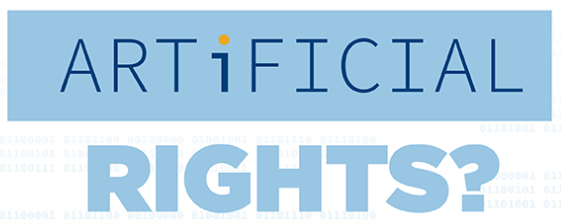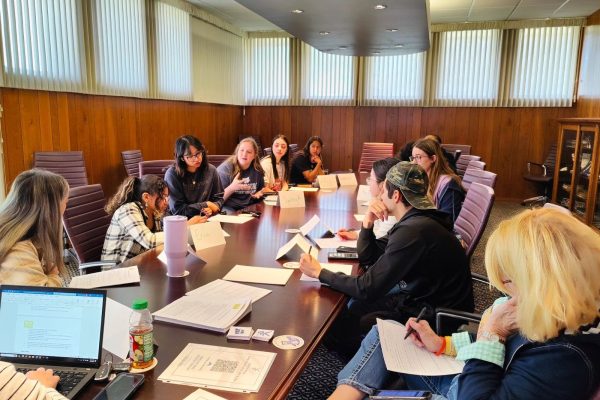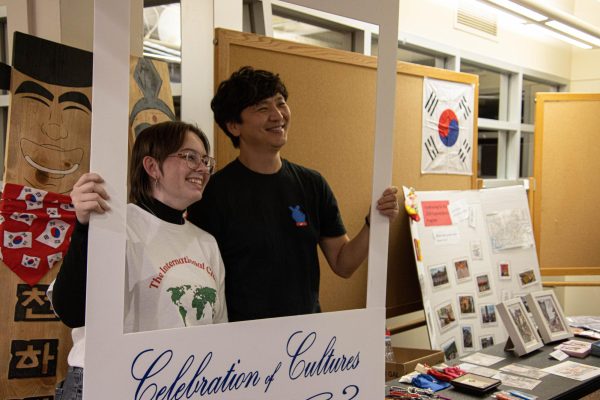Washburn School of Law holding symposium on artificial intelligence

Bright Future? Robot Apocalypse?: The subject of Artificial Intelligence and what rights it may or may not have will be discussed this Thursday. Be a part of the ongoing worldwide conversation about our technological future.
Washburn School of Law’s Robert J. Dole Center for Law and Government in association with the Washburn School of Law Journal will be hosting a symposium on November 5.
The symposium is titled, “Artificial Rights?” and will feature over a dozen speakers from the School of Law, professors from universities across the nation and others in the law profession. It has been organized into three sections where the panelists will be answering questions related to the topic of Artificial Intelligence and the rights it may or may not possess in the future.
“The agenda for the conference is pretty impressive,” said Kathering Gaudry, a panelist at the symposium and a Partner at Kilpatrick Townsend & Stockton LLP. “This rivals other meetings I’ve attended, it’s very forward thinking for Washburn.”
AI has risen in prominence over the last decade and it will likely continue to do so in the near future. It’s already begun to affect many aspects of our daily lives and it can be found in our mobile devices, cars and various household appliances.
The symposium’s objectives include exploring the rights, and wrongs, of AI and the extent to which it has rights and can infringe rights. Many people do not understand what AI is, what rights it possesses or how it is defined in the law and will find the symposium helpful in answering many questions about the technology or putting to rest common misconceptions.
For Gaudry, this symposium presents a formidable cast of law experts who are well versed on the subject of AI and are willing to share their perspectives on the issues at hand.
“I am hoping to clarify some terms and some discussion points I’ve heard and encourage thoughts on the issue,” said Gaudry. “There’s quite a bit of confusion related to AI terminology and to AI understanding. I’ve spoken with really intelligent people before and we have to first define whether we’re talking about A or B.”
Gaudry hopes to not only clarify several misunderstood terms related to AI, such as the debate between Narrow vs. General AI, but also emphasize how far this technology has come in recent years.
“I’ve kind of backtracked because I used to say ‘Now’s not the time! We have decades before this is a pertinent question’. I no longer think that,” said Gaudry.
Washburn Law School professor, David Rubenstein, concurs that AI technology will only become more prominent in the years to come and will be brought into nearly every aspect of our lives. However, he emphasized that it’s increased use, especially by the government, could pose difficult questions for many people.
“One of the reasons why we’re even having discussions about the way that AI can go wrong is because there’s a lot of ways that it could be really useful and beneficial,” said Rubenstein. “Because if it was only going to be bad, the government wouldn’t be using it. The danger of AI is there’s a lot about it we don’t know yet and we also don’t know how it will be used once it’s in the government’s hands.”
Rubenstein went on to speak about how AI can potentially create injustice in the government, take away jobs and be biased against certain groups of people.
“The type of AI that we’re dealing with… it’s not the terminator-type with cyborgs, it’s more of these computer programs that are making predictions based on huge amounts of data and there are algorithms that are already out there that claim to be able to predict where crimes are going to occur and who is going to make commit a crime,” said Rubenstein. “The problem with that is that it’s impossible to make those predictions about what’s going to happen in the future and when you make those predictions based on what’s happened in the past then if the data is biased against African-Americans based on arrest records from the past then that is going to be the data that will train the algorithms going forward. So, that’s a problem.”
But for every potential danger, there are also just as many potential benefits.
“Under the right conditions, AI can utilize and streamline tons of data and information much more effectively and more efficiently than humans can,” said Rubenstein. “It can be great at making predictions for when people need medical interventions, it can make predictions about where to send resources first during natural disasters or other types of public emergencies.”
Each panelist will be bringing their own ideas to the table on Thursday for a discussion that is sure to inspire critical thinking about AI, it’s potential benefits to society and its potential dangers.
The symposium consists of a keynote speaker and two panels: Machine Rights, Machine Inventions and Machine Wrongs. The symposium starts at 9:50 AM with the Washburn Law School Dean Carla Pratt and the Washburn Law Journal Editor-in-Chief Rachel Schwein.
The first panel, Machine Rights, begins at 10:00 AM and features five speakers. This panel will be discussing how the term AI is often used, but not necessarily understood. It will be asking questions such as: Is AI a person too?
A lunch break occurs from 12:00-12:30 PM and will be immediately followed by the Keynote Address, Machine Inventions, featuring Katherine Gaudry and Paige Reese, the Senior Articles Editor of the Washburn Law Journal. The Keynote speaker will be discussing if it is possible for AI to receive a patent and at what point a computer system becomes the inventor.
The second panel, Machine Wrongs, begins at 1:15 PM and will also feature five speakers. They will be discussing how far AI has come so far in regards to its expansion into our daily lives, if AI can be discriminatory and how AI will affect the fields of health care, employment, contracts, military defense and more. The speakers are set to adjourn at 2:45 PM.
The symposium will be held entirely over Zoom. Attendees will need to register online to be able to view the discussion here. Attendees can also find more information about the symposium using the previous link as well. The event is free of charge.
For more information about the symposium, it is recommended that you contact one of the event’s organizers such as Rachel Schwein or Paige Reese.
“It’s going to drastically change the nature of the workforce in the government but also in the private sector and the question is, will it eliminate jobs? Definitely,” said Rubenstein. “But it’s also going to create jobs and so the question is, how is that going to affect people?”
Your donation will support the student journalists of Washburn University. Your contribution will allow us to purchase equipment and cover our annual website hosting costs.







